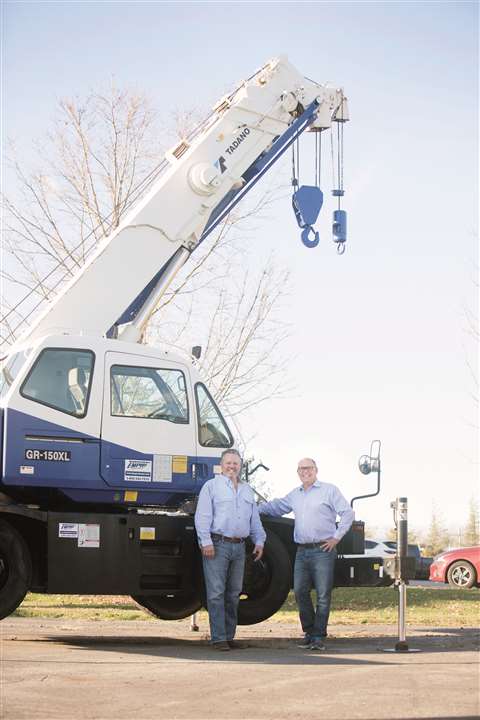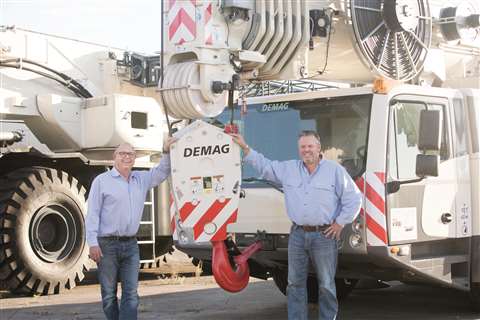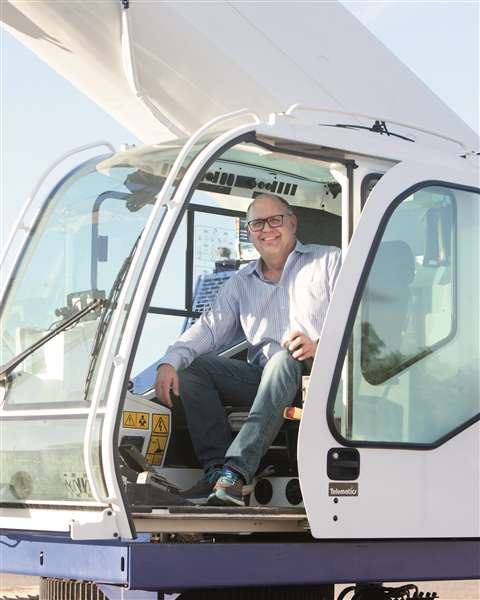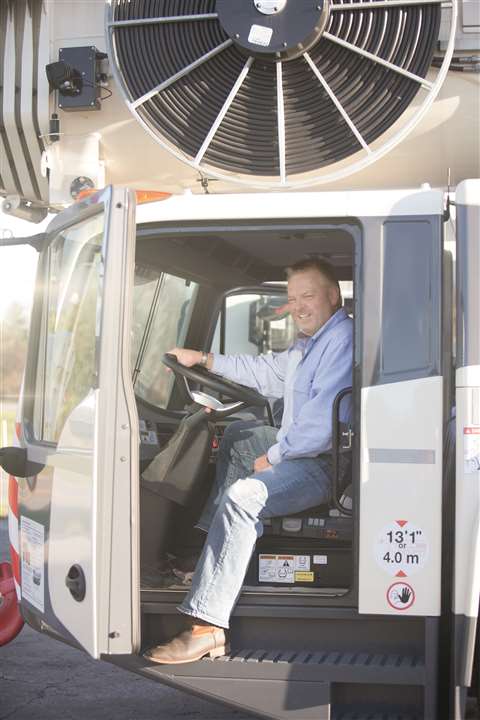The evolution of Empire Crane
03 March 2022
As Empire Crane celebrates its 20th anniversary, Hannah Sundermeyer speaks with founders Luke and Paul Lonergan, the sibling duo who aren’t afraid to push the envelope.
Luke and Paul Lonergan embody every aspect of a family business. To the two brothers, the most important part of Empire Crane is the people who work there. With a father-son team working in the service department, Paul’s 21-year-old son will soon join the business, and many other similar dynamics, Empire truly is a family affair.
 Empire Cranes is celebrating its 20th anniversary this year. The company represents several manufacturers, including Tadano (including Demag and Mantis brands), Kobelco, Manitex, Terex, Magni and Broderson.
Empire Cranes is celebrating its 20th anniversary this year. The company represents several manufacturers, including Tadano (including Demag and Mantis brands), Kobelco, Manitex, Terex, Magni and Broderson.
“You’re only as good as your employees, your team and your partners, from the crane manufacturers to the banks,” said Luke. “But ultimately it really comes down to the employees that are working with you.”
Paul Lonergan is president of Empire Crane. He has been working full time in the crane industry since he graduated college in 1988, working for his father Tom Lonergan, who owned a crane distribution and heavy equipment dealership that started in the early eighties. Tom was a factory manager for Pettibone Cranes, and then started his own dealership in 1983. Paul spent his summers helping the mechanics and learning the intricacies of the business, sweeping the floors and even cleaning the bathroom. Graduating college on a Saturday and walking into the dealership on Monday, he said “cranes are all I’ve ever known, and all I’ve ever done.”
Luke Lonergan serves as CEO. Unlike Paul, he worked on the other side of the family business, a garden center/farm market. With a background in business and marketing, in 1988 Luke relocated to Florida to work with friends who were day traders. In 1999, when he moved back to Syracuse, N.Y., it was the height of the “Big Dig” project in Boston. A nearly $19 billion dollar job, there were more cranes in New England than anywhere else in the country, or the world for that matter. But despite being new to the industry, Luke decided to take the leap and enter the family crane business. And the rest is history.
Brotherly bond
While working a job on Christmas Eve in 2001, the brothers realized that they could run a crane company on their own. With a $100 bill and a free checking account, Empire Crane was born. To this day, Luke still jokes that Paul owes him his $50 share. With the crane business in their blood and pride of operating from New York, (the Empire State), the brothers founded Empire Crane. In the beginning the company only had five employees and zero crane inventory.
In January of this year Empire Crane celebrated its 20th anniversary. Enduring economic challenges and technological changes, the company has grown exponentially in a short span of time, all the while maintaining the same family values and steadfastness.
Empire Crane is an authorized dealer for Tadano (including Demag and Mantis brands), Kobelco, Manitex, Terex, Magni and Broderson. Initially starting out as a flagship Terex dealer, Paul and Luke attribute their success to the support of Ron De Feo, the former chairman and CEO of Terex Corporation. In March 2002, the Lonergans met De Feo at ConExpo. At the time, the duo didn’t have many manufacturers that were willing to work with such a newly established company. But while others saw their youth as a liability, De Feo was inspired by the brothers’ tenacity.
“He knew we were going to hustle, and he gave us the opportunity. We’re always grateful for him,” said Luke.
Over the next 18 years, Empire crane sold hundreds of Terex cranes, from boom trucks, crawlers, rough terrains and more.
 The Lonergan’s father always told them, ‘The work really begins when you get the crane sale.’
The Lonergan’s father always told them, ‘The work really begins when you get the crane sale.’
Surviving ‘survival mode’
“Maybe we didn’t know any better, but our second favorite word is risk,” said Paul. “First, was the perseverance we had in our youth, and then our willingness to take the risk. Next thing we knew, we were ordering cranes with the promise to Terex that they would be paid for in full before they shipped.”
The brothers remember the first few years working in survival mode, but in time they established strong credit lines, started taking trades and expanded their inventory. As the crane market recovered, Empire Crane started to flourish. In 2005, 2006 and 2007, “things really came alive.”
“During this whole time, we had a presence in New Jersey and Greater New England,” said Luke. “But then we also were networking with fellow dealers throughout the country, which removed the risk we had when ordering inventory. Soon we were selling hundreds of cranes through just relationships.”
Despite the economic downturn with the housing crisis and the economy in the third and fourth quarter of 2008, the company survived, focusing on its contractual territory in New England.
During our conversation, I was fortunate enough for Paul and Luke to clue me in on one of their many trade secrets.
“We’ve adopted a two-minute policy, like two-minute drills in an NFL football game,” Luke explained. “When somebody reaches out to us and makes an inquiry, our team has two minutes to respond to that inquiry. In today’s world, it could be an email, a text, a phone call or a fax. It’s always mind boggling, whether the customer is spending $200,000 or $2 million, and says, ‘Hey, thank you for calling me back.’”
True to their reputation, the Lonergan’s responded to my request for an interview at lightning speed, and they were eager to connect. Consummate professionals, go-getters and equally warm personalities, both Luke and Paul are a pleasure to talk to. With a willingness to forge ahead and put in a hard day’s work, I think their insight into running a successful family business is inspiring and encouraging.
When starting Empire Crane, how did you decide to divide up the responsibilities? How has this evolved?
Luke: With Paul’s 15 years of experience in the business prior to Empire, I was out there as the new guy. I was always a phone call away from an answer, whether I called my father or my brother. If I didn’t know what the capacity was or what the boom length was, I had two industry leaders who could get me the answer. So, when the business started, I took care of the financial obligations, trying to set up the lines of credits, working with the banks, working with human resources and working with payables. I also took a liking to the parts department.
Paul had the relationships with the manufacturers, and he knew the people. There are so many different levels when it comes to the manufacturers. There’s the CEOs and vice presidents, but it’s also building the relationships with the service departments and the warranty departments for after-sale support. Paul always kind of took care of that. Luke and I also still do our fair share of selling. And that’s kind of how we broke down the responsibilities out of the box.
Paul: I knew the end-users in the different industries that were using the cranes. So, there’s really a lot of past client relationships. But more-so, just having grown up around it and having a passion for the equipment and running the equipment. I’m not a licensed operator, I was the kid playing with Tonka trucks and still got ‘em in my mom’s basement.
Luke: Syracuse, NY is our homebase. We were born and raised here. Paul oversees the New Jersey operation and all facets from part sales and service. My responsibilities are to oversee the Boston location, which is in Holbrook, MA with part sales and service. That’s a part of our everyday workload. We also have key people in all locations including Anthony Caltabiano in New Jersey and Justin Melvin in Massachusetts. Empire has great professional leadership at each location.
 “It comes down to being accountable and being available every possible minute, from the manufacturer to the customer to the employee.” Luke Lonergan, CEO, Empire Crane
“It comes down to being accountable and being available every possible minute, from the manufacturer to the customer to the employee.” Luke Lonergan, CEO, Empire Crane
What is the focus of Empire Crane?
Paul: Sale of new and used equipment and the support of it through our parts and the service repair shop. I mean, we truly are providing the customer with the best lifting solutions in our 100-year experience overall with an all-hands-on deck mentality, combined with service and parts. We are providing customers with the best lifting solution for their industry, for both new and used.
How does Empire Crane distinguish itself in the markets it serves?
Luke: I think it’s a combination of wanting to be the best in the industry from a dealer standpoint and the quality of the people that we have working [with us.] We want to support the products, support the manufacturer and take care of our people. The longevity of our employees is probably the best in the industry. It comes down to being accountable and being available every possible minute, from the manufacturer to the customer to the employee.
Paul: We attend every SC&RA function, and we’re present at industry events. We go to Bauma and we go to ConExpo. We are very visible. As two owners, we probably travel more than anybody in the industry, in our position to meet the customers and thank the customers. We are always looking for new opportunities.
What is it about the crane business that keeps you engaged?
Paul: I think the continued progression of the cranes themselves with the technology and benefits, the size of the cranes, the length of booms, every day is a new opportunity. And every day is a new challenge.
Luke: On top of that, it’s retaining the customers that we’ve developed over the last 20 years for the continued business. That alone is telling us we are doing something right, if someone is coming back a third, fourth, fifth, sixth time.
Paul: Our father’s famous line was, “The work really begins when you get the crane sale.” You worked on quoting it, you worked on visiting the customer, but once you close the deal, that when you really need to perform. That’s when you need to be there for service, parts and be there for the good and the bad.
Luke: Over the past 20 years, the challenge has never been harder to keep the customer happy because of the lack of availability of spare parts, new cranes and trucks and engines. That’s a challenge in itself for pricing. What are we going to do to get this crane up and running? Our normal supply chain had inventory available from FedEx three days later, but now you’re calling a customer and quoting them at 10 weeks, 16 weeks, 25 weeks. It’s painful. How do you tell a guy, well, we can’t change your oil because there’s no filter kits available? You persevere through all these issues to, at the end of the day, overcome the hurdles. You must do what you need to do, to make it right.
Paul: And that’s a big thing, overcoming the challenges and the hurdles of the present time of life in the crane world.
Luke: We were on the offensive, even pre-Covid. We were never known to be bashful when it came to ordering inventory and in some economic downturns, trust me, it’s been a little painful, but we’re fortunate enough that we stayed a little on the aggressive side during the pandemic because sooner or later, things will change. And the workload around the country, every one of our customers will say, they’re busier now than they’ve ever been.
 “First, was the perseverance we had in our youth, and then our willingness to take the risk.” Paul Lonergan, President, Empire Crane
“First, was the perseverance we had in our youth, and then our willingness to take the risk.” Paul Lonergan, President, Empire Crane
What are you most proud of in the evolution of Empire Crane?
Luke: We started by opening that free checking account. But the fact that we’ve gone through three or four different economic ups and downs in the last 20 years, we’re still weathering the storm. We’re still going to battle every day – and what we’ve been able to bring in the crane industry, and what we’ve been able to provide for the employees of 25 families.
Paul: From the beginning to today, getting ourselves in the position to represent some of the finest lines in the crane world. That’s who we are. We’re representing the A-team of crane manufacturers.
What have been the biggest challenges in running a family business over the past 20 years?
Paul: Luke and I are 15 months apart. Our mother would say we fought like cats and dogs when we were younger. But as partners, as brothers, we hear a lot of people in the industry or in other family businesses that complain about working with relatives. But I can honestly always sit here and say, when we’re doing a deal or making a business decision, we are 97 percent on the same page, 99 percent of the time.
Luke: People from the outside might look and say, How the hell do those two get along? Over the 20 years, it’s nice that there’s just two of us and not three or four or five. At the end of the day, even if we’re not on the same page, we better be before five o’clock, before the end of the day or when we hang up the phone.
What does the future hold for Empire Crane? Do you have a succession plan?
Luke: We think coming out of the last couple years, we’ve felt that 2022, 2023, 2024 is nothing but an upside. We need to grow our team. We need technicians. We need more sales guys with the lines that we’re carrying now. I think there’s nothing but an upside for Empire Crane going forward.
Paul: As far as the succession plan goes, we’re looking forward to talking about our 30th anniversary.
Luke: That sums up the next 10 years. Looks like we’re going to work.
As we approach a post-pandemic environment, how do you describe the market for crane sales and rental?
Luke: A good indicator for us is when the dirt equipment is really, really busy. And if you think of the logic, they have to clean the level surface first with the dirt equipment before they can start any of the building process. When I hear the foundation guys saying there’s a lot of work out there, we historically follow that trend over the next few years. We are very comfortable and confident with the bright side ahead for the next two to three years. Forget about rates. Forget about inflation, forget about what’s going on in Russia. Forget about what’s going on in D.C. The world’s not going to stop, and we’re just going full steam ahead.
What do you do when you’re not working?
Luke: Well, life is a balance. To succeed in the professional level of what we do for Empire Crane, everybody needs a mental release. When I’m not spending time with my wife doing what she wants to do, a perfect day for me includes a couple thousand yards of swimming in the morning, maybe followed by a tennis clinic that night. But doing those things enables me to keep my head sharp and my head clear. Especially at 57 years old, you must be able to do these things.
Paul: I like the outdoors and hunting and having some free time. I have a place in the Adirondacks, and it’s nice to have a place where I can relax or spend some time in a tree stand. I have a lot of time to, you know, reflect on life and work and enjoy some quiet time.
STAY CONNECTED


Receive the information you need when you need it through our world-leading magazines, newsletters and daily briefings.




